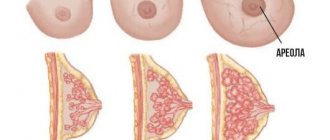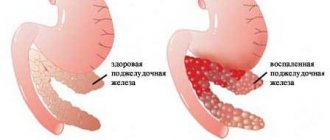Belching and its causes in pregnant women
Belching is the spontaneous release of air from the stomach into the esophagus, into the mouth and out. There are many reasons for the occurrence of this phenomenon in women carrying a child:
- The growing uterus puts pressure on the organs in the peritoneum, and the stomach moves relative to its original position.
- Changes in the hormonal background of the female body.
- The digestion process does not complete; the residues accumulate in the stomach and stretch it.
Arbitrary release of air is provoked by certain physiological factors:
- When a pregnant woman lies on her back and suddenly turns onto her side.
- The expectant mother does not follow the prescribed diet. The diet contains fried, spicy, fatty foods, in quantities greater than they should be.
- Bend forward to put on shoes.
The phenomenon of belching during pregnancy must be combated, no matter in the first trimester or in the last term. Spontaneous release of air at the beginning of an interesting situation requires a visit to a doctor and his consultation.
Belching in the second trimester of pregnancy
Belching during pregnancy in the second trimester occurs for a number of reasons:
- enlarged uterus;
- uncomfortable positions during sleep;
- binge eating;
- tendency to constipation;
- eating foods high in glucose;
- sudden movements in everyday life.
When lying down, belching occurs much more often. Starting from the second trimester, doctors recommend that pregnant women not take horizontal positions on their back while resting. In this position, the fetus begins to put pressure on the inferior vena cava, bladder, liver, and intestinal walls. Many people feel the need to rest lying down after eating. Even a light afternoon nap is possible. Turning from side to side while sleeping can also cause belching as a result of a rapid change in position and compression of the digestive tract.
In the second trimester, a woman continues to be active in everyday life, cleaning the apartment, washing floors and dishes, and constantly coming into contact with household chemicals. The body of a pregnant woman, constantly exposed to stressful situations, accumulates “fear” hormones, causing increased gas formation.
A sharp release of gases through the oral cavity is caused by a rapid contraction of the diaphragm from overcrowding of the upper parts of the small intestine with gases and feces. In these cases, the air masses emanating from the oral cavity may smell like eggs, sometimes turning into the smell of hydrogen sulfide. Belching “eggs” during pregnancy is a typical sign of nutritional disorders. First of all, you should pay attention to the amount of food you eat. Frequently consumed meat, especially smoked and fried meat, gives off a rotten smell. In the first and second trimesters of pregnancy, a woman is plagued by toxicosis. It is severe toxicosis that lasts until the second trimester that causes belching with an admixture of hydrogen sulfide.
If you detect the smell of hydrogen sulfide from the digestive tract, you should not exclude the development of serious pathologies of the digestive organs. This is a high risk for both the woman herself and the embryo. Perhaps there is an open ulcer of the stomach or duodenum, impaired liver function, or tumor processes in the sigmoid colon. Such conditions should be diagnosed by a specialist who monitors the woman throughout pregnancy.
Types of burps
Infrequently repeated, odorless and unaccompanied by unpleasant sensations, emitted gases are acceptable to ignore. If you experience discomfort, an unpleasant odor or heartburn, there is reason to worry.
Burping rotten eggs
The food remaining after the digestion process and not exposed to acid and enzymes accumulates in the stomach and another process begins - rotting. The breakdown of proteins occurs slowly, the smell of rotten eggs appears, scientifically - the smell of hydrogen sulfide.
The main period of gestation when a similar phenomenon is observed is in the second trimester and during late pregnancy. Sometimes it is accompanied by heartburn if unhealthy foods are consumed: fast food, fatty, fried.
Diarrhea, belching, and other uncomfortable conditions may go away in a few minutes or last for three hours, indicating problems with the stomach.
In the last stages of pregnancy, a hydrogen sulfide smell appears because the baby growing inside puts pressure on the digestive organs. The food stagnates, rotting occurs and a “flavor” appears. It is most often observed in a supine position, when the fetus puts especially intense pressure on the stomach.
A growing child is not always to blame for the appearance of gases with rotten eggs. A gastrointestinal disease or one that occurs during toxicosis becomes a source of unpleasant phenomena: ulcers, inflammation of the mucous membrane, liver dysfunction, disruption of the gallbladder.
Constant belching with diarrhea or vomiting indicates the poor quality of the previously eaten product. Self-medication will not work - only seeking medical help, since the unborn baby is at risk.
Belching food
The appearance of food in the esophagus that was previously contained in the stomach indicates slow movement of the stomach muscles. Food is retained inside the organ and in the esophagus. At the same time, the channel carrying food begins to stretch. Symptoms remain after childbirth. To solve this situation, you need to switch to eating small portions at certain intervals. Increasing physical activity, walking, and breathing fresh air will also help. This will have a good effect not only on the functioning of the upper digestive organs, but also on the intestines; food will begin to move through the gastrointestinal tract faster.
Belching air
Occurs during a lively conversation while eating. A pregnant woman does not think about food, chewing goes poorly and large pieces end up in the stomach. After such a meal, the air begins its sharp upward movement, the diaphragm contracts and hiccups occur. A pregnant woman should follow the normal process of eating.
Belching with bitterness
With a bitter belch, bile enters the esophagus and then into the mouth. The reason is the weakening of the sensitivity of the lower part of the canal, where the sphincter is located, during reflux phenomena (gastroesophageal and duodenogastric). The release of air with a bitter taste is a symptom of diseases:
- chronic gastritis;
- stomach ulcer;
- JVP – dysfunction of the biliary tract. The movement of bile is difficult;
- gallbladder disease associated with the formation of stones;
- cholecystitis;
- inflammation of the small and large intestines;
- the appearance of new formations in the gastrointestinal tract;
- the presence of parasites in pregnant women.
The release of gas can cause heartburn and a sour taste in the mouth. If these symptoms occur rarely, there is nothing to worry about. Frequent belching, accompanied by abdominal pain – it’s time to visit a gastroenterologist.
Sour belching
A sudden rush of air after eating, accompanied by a sour taste in the mouth, has been linked to GERD. Gastroesophageal reflux disease is a chronic disease with frequent relapses of stomach contents into the esophagus, resulting in injury to the lower part of the esophagus. In a pregnant woman, sour belching is felt along with heartburn and bloating is observed. A discomforting state appears closer to the birth process. As a rule, after the birth of the child, the discomfort disappears.
If the expectant mother has previously suffered from dysfunction of the digestive system, GERD will also manifest itself during pregnancy in the early stages of gestation. Causes:
- Foods whose properties include provoking the production of more gastric juice: vegetables, fruits, sour berries, coffee, chocolate, juices.
- Eating more food than the gastrointestinal system can digest.
- Eating while lying down.
- Lack of physical activity.
- Drinking alcoholic beverages.
- Taking medications.
The constant reflux of contents, along with pepsin and hydrochloric acid, into the esophagus leads to injury to its lower part and the occurrence of inflammatory processes. The duodenum also refluxes contents into the esophagus. Difficulty in the gastric sphincter. A feeling of sourness in the mouth, severe heartburn, nausea and the presence of reflux processes indicate possible diseases: gastric or duodenal ulcers, chronic gastritis, a hernia in the opening of the esophagus near the diaphragm.
A timely visit to a gastroenterologist will help to find out the causes of discomfort. You should undergo an ultrasound, gastroscopy, and tests.
The smell of acetone when belching is a sign of low blood sugar levels in the expectant mother. If a woman did not suffer from diabetes before pregnancy, then the appearance of a chemical odor is associated with toxicosis and malnutrition. In the absence of toxicosis, you should consult a gynecologist about the smell of acetone.
Belching with a fishy smell
The appearance of a fishy odor is not associated with problems with the digestive tract. This is when the fallopian tubes open and the smell comes from the genitals. A consultation with a gynecologist is required here. Maintaining intimate hygiene will help avoid fishy odor. Perhaps the release of air with a taste indicates the beginning of inflammatory processes. The gynecologist will select medications that are safe for the unborn child.
Diagnostics
To find out the cause of these symptoms, you need to analyze other symptoms, such as nausea and belching, vomiting, diarrhea or constipation, heartburn, weakness, low-grade or febrile temperature. It could also be an allergy to some product. To find out for sure, you need to perform the following diagnostic methods:
- donate urine and blood;
- check your sugar level;
- do a gastroscopy and x-ray of the stomach;
- check the heart;
- determine the acidity level;
- do an ultrasound examination of the abdomen.
After receiving treatment, you must follow a diet. No need to smoke, drink alcohol, or overeat. You need to eat little and often. Eliminate salty, fatty, spicy foods completely from the menu or eat them only in extreme cases.
This disease is diagnosed by fibrogastroscopy, when a thin tube with a microscope at the end is inserted through the mouth. This type of research is not dangerous and is informative. It happens that an advanced disease leads to complications, such as gastric and duodenal ulcers, gasrtitis, GERD and other diseases of the gastrointestinal tract.
When heaviness and belching of air do not go away within several days and are not associated with an eating disorder, you should visit a specialist.
When suspicions are not confirmed, he refers the patient to a gastroenterologist, who carries out a thorough and comprehensive diagnosis.
Fibrogastroscopy is considered the most effective way to examine stomach diseases. The procedure is painless and makes it possible to detect various diseases of the stomach and duodenum.
During an internal examination, it is possible to identify gastritis, peptic ulcers, polyps and malignant neoplasms.
If necessary, the specialist prescribes additional diagnostics and tests, based on the results of which treatment is determined.
Basically, a complete blood count, abdominal ultrasound and a blood test for Helicobacter pylori are required.
Based on these tests and diagnostics, it is possible to establish the root cause of painful symptoms, which will make it possible to make the treatment more effective.
Belching treatment
The specialist prescribes the necessary treatment for belching. The first thing doctors advise is to follow a diet. Make small portions of food, take them at a certain time, about 5-6 times. It is recommended to exclude from the diet foods that cause fermentation in the intestines: cabbage, grapes, etc. Reduce the consumption of potatoes, bread and oatmeal.
Eating dry food and drinking carbonated drinks will not do any good. Bad habits will have to be abandoned; they are harmful to the child’s health and negatively affect the digestive organs. A glass of plain water 30 minutes before meals - drink in small sips. Thoroughly chewed food is better absorbed and creates less unpleasant sensations: heaviness, belching, heartburn. It is not advisable to eat before bed.
Drug therapy
Diet is not always able to cope with the discomfort that arises. Then medications come to the rescue.
- Maalox. A drug that can help a pregnant woman get rid of belching and heartburn. Thanks to the substances contained in the medicine, when it enters the stomach, hydrochloric acid is neutralized, enveloping the walls of the stomach and protecting the mucous membrane.
- Rennie. Tablets that can remove excess acidity prevent belching.
- Phosphalugel. Available in the form of a suspension that acts instantly. Neutralizes hydrochloric acid, which is found in excess in gastric juice, relieves belching.
The expectant mother must remember that not a single medicine, even the most harmless one, should be taken without first consulting a doctor.
Folk remedies
In the fight against belching, traditional medicine comes to the rescue; the intake is supervised by a specialist.
- Plantain and cardamom. Sold dry. Medicinal herbs are placed in boiling water, boiled, cooled and the drink is ready. Tablespoon before meals.
- Cranberries in any form. A rich set of microelements will be useful not only for the mother, but also for her child.
- Mint tea or lemon balm tea will help with hydrogen sulfide belching. The nervous system is restored, stomach cramps disappear, and the digestion process returns to normal.
- Chamomile tea stops spasmodic actions in the esophagus and eliminates inflammatory processes in the stomach. Performs a bactericidal effect, reduces food stagnation, and prevents putrefactive reactions from occurring.
The happy end of pregnancy and the life of the child are in the hands of the woman.
Belching during pregnancy in the early and late stages is a completely expected phenomenon, since the functioning of the digestive system undergoes significant changes during the period of bearing a child. If there is a constant repetition of the release of air from the stomach, it is worth paying attention to other accompanying symptoms and identifying the cause of the discomfort.
Diagnosis of continuous belching
It is necessary to diagnose belching during pregnancy only in cases where the symptoms create too much discomfort. A gastroenterologist comes to the rescue and will conduct safe tests.
One of the diagnostic procedures for constant belching during pregnancy is fibrogastroscopy (FGS). A small tube is inserted through the mouth into the patient's esophagus and lowered into the stomach. FGS gives a broad clinical picture without causing irritation to the digestive organs. In this way, you can diagnose the following diseases of the digestive system:
- gastritis;
- gastroduodenitis;
- peptic ulcer of the stomach and duodenum;
- esophageal erosion;
- obstruction of the esophagus;
- tumor processes of internal organs.
Another option for a “gentle” and safe diagnosis is gastroscopy. An endoscope inserted through the esophagus into the stomach makes it possible to take tissue samples of the mucous membranes for subsequent histological examination. Thanks to this method, it is possible to identify the exact cause that caused prolonged belching.
Procedures involving the insertion of a probe into the internal organs of the digestive system require preliminary preparation on the eve of the procedure. A woman's stomach should not be filled with food. It can be difficult for a pregnant woman to resist even a light breakfast after a night's sleep, so the doctor prescribes the procedure for the morning. The day before the study, a woman should adhere to the following diet, excluding certain foods:
- meat;
- fish;
- beans;
- peas;
- beans;
- peanut;
- chocolate;
- milk.
The appearance of belching in early pregnancy
Many women experience belching early in pregnancy. This phenomenon is due to a sharp change in hormonal levels. At the same time, changes occur in the functioning of the digestive system, which are reflected in flatulence and indigestion.
When pregnancy occurs, the ratio of progesterone and estrogen in the female body changes dramatically, which leads to hormonal imbalance and affects the general condition of the pregnant woman. Against the background of such phenomena, belching most often develops with other symptoms of disruption of the digestive tract.
Constant disturbances in digestion can cause constipation. With this phenomenon, excess gases are formed in the stomach, which leave the body along with belching. Symptoms are quite typical in the first trimester of pregnancy. Discomfort must be eliminated, as it can lead to more serious consequences.
A sign of pregnancy is belching
The first signs of pregnancy may occur differently for each woman.
For some, belching appears immediately after conception and continues until childbirth. It happens that belching is the first and only factor that indicates the birth of a new life, while other pregnant women may be bothered by burning and vomiting. Each person has his own unique characteristics. For example, reactions to the same stimuli, the same events, manifest themselves differently in different people. In the same way, every woman’s pregnancy proceeds only according to her own unique scenario.
Belching, as a sign of pregnancy, can appear in the early stages of pregnancy - in the first trimester, and in the middle of pregnancy - in the second trimester, and at the very end of pregnancy - in the third trimester. It is impossible to predict how pregnancy, especially the first, will go for any particular woman.
Belching in expectant mothers can signal pathological changes in the body, including hormonal imbalance. The cause of this symptom may be gastrointestinal diseases.
Belching air may indicate the onset of serious problems with the digestive tract in a woman:
- belching rotten eggs during pregnancy indicates stagnation of food in the stomach. The phenomenon also occurs quite often with pancreatitis and gallbladder pathologies. This occurs due to an insufficient amount of enzymes that would help break down food and digest it. In this regard, the contents rot in the stomach and hydrogen sulfide is released, leading to rotten belching;
- sour belching also manifests itself in gastrointestinal pathologies. A woman may have inflammation of the duodenum, stomach or ulcer;
- a feeling of bitterness in the mouth, belching, nausea and pain under the right rib indicate pathology of the liver and gall bladder. These symptoms appear if a woman is diagnosed with poor bile production, stagnation or impaired outflow.
Belching air during pregnancy is considered less dangerous. Most often it occurs if a woman talks while eating or eats while walking. The principle of appearance is as follows - food enters the stomach with a large amount of air, the food is chewed little and swallowed in large pieces. In this case, air lumps form in the stomach, which appear over time and cause discomfort to the expectant mother.
Causes of early belching
The development of belching in the first months of pregnancy is due to various reasons, which are discussed in detail in the list below:
- changes in hormonal levels. After fertilization of the egg, the body experiences increased production of progesterone, which affects the digestion process in the body. As a result, the formation of excess gases and belching may occur;
- a slight decrease in the abdominal muscles, which leads to the entry of stomach contents into the esophagus and the formation of belching immediately after eating;
- disorders of the autonomic nervous system, which control all vital processes in the body;
- improper food intake and large swallowing of air can cause belching, as excess gases will be expelled;
- eating food in large pieces, which leads to difficult digestion and belching. When eating, you should chew your food thoroughly and do not eat raw food;
- uncomfortable position while eating. It is recommended to eat food while sitting at the table. It is imperative to avoid eating foods while lying down, as in this case food may pass poorly through the esophagus and cause unnecessary discomfort;
- consumption of large amounts of confectionery substances containing sorbitol. This substance is an artificial sweetener and has a very negative effect on the digestion process, so during pregnancy it is preferable to eat foods of natural origin;
- Sweet carbonated drinks contain a considerable number of chemicals, so they can also cause belching. It is best to drink purified still water, compotes from fresh or dried fruits;
- some types of foods themselves can cause belching (legumes, white cabbage, grapes, bananas);
- excessive consumption of sour, pickled, canned, salty and smoked foods causes excessive stress on the stomach and contributes to the formation of belching;
- excessive consumption of foods containing simple carbohydrates (fresh baked goods, baked goods, pasta);
- Constant intake of vegetables and fruits with a high content of sucrase and fructose can also have a beneficial effect on the occurrence of belching (onions, pears, artichokes);
- exacerbation of chronic diseases in the body with increasing load (pathologies of the intestines, stomach, gall bladder);
- congenital anomalies of the gastrointestinal tract and intestines with the growth of the uterus can also change their size and have a negative effect on the body, which will lead to the appearance of belching.
Main symptoms
Symptoms of belching include the occurrence of characteristic phenomena indicating discomfort in the digestive tract:
- release of air from the stomach, which is accompanied by a characteristic sound;
- involuntary contraction of the diaphragm during belching;
- formation of an unpleasant odor reminiscent of rotten eggs;
- the appearance of a sour taste in the mouth.
Depending on the cause of belching, additional signs may develop that indicate a disorder in the body. Severe course of the phenomenon and deterioration of the general condition requires immediate consultation with a doctor.
In this case, it is necessary to consult a gastroenterologist and conduct research to establish an accurate diagnosis. The main method of identifying the cause of this unpleasant phenomenon is gastroscopy (examination of the stomach using an endoscope and taking biological material for study if necessary).
What to do if you constantly burp
If frequent belching occurs and the development of serious diseases is excluded, you can try to deal with the discomfort using simple methods and traditional medicine. At the initial stage, it is necessary to follow a diet and exclude all harmful foods (flour, confectionery, legumes, carbonated drinks, salty, sour, pickled foods).
Doctors recommend following the simple recommendations discussed in the list below:
- avoiding severe overeating, organizing split meals up to 7 times a day in small portions;
- drinking one glass of purified still water after a large meal an hour after eating;
- prohibition of eating before bedtime. It is preferable to have dinner 2-3 hours before going to bed;
- sufficient fluid intake during the day (at least 1.5 liters);
- providing a varied menu with a balanced content of fruits, vegetables, meat, fish, cereals;
- preparing tea with ginger or mint, which has a beneficial effect on the digestion process in the body;
- taking a special decoction of flax or oatmeal. These products coat the stomach walls well, cleanse and have an anti-inflammatory effect.
Treatment and useful tips
Belching during pregnancy, the treatment of which is often unsuccessful due to the physiological state of the woman, sometimes creates a critical condition. A doctor observing a pregnant woman may prescribe adsorbents and a gentle diet. The main treatment for prolonged belching is to limit the consumption of certain foods and dishes.
First of all, it is advisable to get rid of the following products:
- fresh white bread;
- baked goods;
- strong meat broths;
- spices;
- fried eggs;
- mushrooms;
- pickled berries and vegetables;
- too sour berries and fruits;
- alcoholic drinks.
After eating a meal in which some new dish has been introduced, you should carefully monitor your condition, paying close attention to any changes in the body. In principle, it is not so difficult for every woman to identify foods that cause excessive fermentation, increased gas production, heartburn, and following these signs, belching.
By introducing foods that reduce heartburn into your diet, there is a chance to get rid of belching during pregnancy. The following products will be effective here:
- crackers;
- biscuits;
- steamed meat dishes;
- low-fat cottage cheese;
- buckwheat and rice porridge;
- almond;
- walnuts;
- about 1.5 liters of purified still water (per day).
For drinks, preference should be given to weak teas, cocoa with added milk, fruit jelly, and kefir.
The last meal can be taken 2-3 hours before going to bed. In cases where the diet does not give the desired results, a gastroenterologist will come to the rescue. Regular overeating by a pregnant woman and the inability to control her eating behavior is the root cause of constant belching.
In parallel with the necessary organization of the diet, it is very important to improve your eating behavior. Key recommendations are listed below:
- You should eat food in a calm environment, chewing each piece thoroughly.
- Before eating, you can drink a glass of purified water in small sips at least half an hour before eating. If there are no contraindications, you can add a few drops of mint essence to the water, which has the ability to resist belching.
- Temporarily limit the intake of raw berries and vegetables. You can make jelly or compotes from fruits. Vegetables can be consumed steamed or stewed.
- If possible, it is advisable to quit smoking.
- You should only eat purified water, not distilled or reverse osmosis water. At home, you can filter water using filters designed for this purpose. The daily intake of liquid should be 1.5-2 liters.
- Avoid tight clothing, belts and elastic bands in the abdominal area. Tight clothing puts pressure on the organs of the gastrointestinal tract, contributing to the accumulation of large volumes of gases in the intestines, and this is the primary reason for the subsequent prolonged belching.
- After eating, you should avoid sudden movements, bending forward, and jumping. You can't go straight to bed. The best posture after eating is sitting.
- During sleep, you can place small additional pillows under the lumbar area.
We also recommend reading: Can pregnant women smoke?
How to get rid of belching and treat it correctly
The development of belching during pregnancy does not require any therapy. All preventive measures are aimed at eliminating the unpleasant symptoms of the phenomenon. The most effective folk remedies are with prior consultation with a leading gynecologist:
- Calamus root powder is especially effective for belching. The dosage is 1/3 teaspoon 3-4 times a day after eating;
- a decoction of raspberry leaves, chamomile, blackberries, mint in equal proportions. The product effectively eliminates negative symptoms and saturates the body with valuable nutrients and microelements;
- preparing tea with mint and lemon balm for general toning of the body;
- centaury tincture, which is prepared in the ratio of 10 grams of herb per 200 ml of boiling water. The brewed product is kept for 4 hours, and then used 1 tbsp. spoon a day 3-4 times before eating;
- 15 grams of common heather is brewed in 500 ml of water. The finished product is consumed half a glass 2-3 times a day;
- chewing cloves before eating, as this spice is absolutely safe for women during pregnancy;
- using a pinch of baking soda dissolved in water. The finished product is taken orally immediately after meals. It is best to pre-coordinate this procedure with your doctor.
Severe manifestations of belching require careful prescription of pharmacological drugs that can be used during pregnancy. At the same time, in the first trimester it is best to stop taking medications, since this period is the most important in the development of the unborn child.
How to deal with an unpleasant symptom
There are several tips on how you can reduce the number of cases of belching to a minimum, that is, help yourself. If you stick to them, belching will appear less and less often. Adviсe:
- Eat often, but little by little.
- Do not eat sour or fatty foods, foods that cause fermentation and, as a result, excessive gas formation. Such products include cabbage, asparagus, and beans.
- Include in your diet foods that have alkaline (opposite to sour) properties: dairy (cream, sour cream, cottage cheese), soft-boiled eggs, steamed omelettes, butter or vegetable oil, boiled lean meat. As for vegetables, it is better not to eat them raw, but to boil them, and bake fruits (for example, apples), if, of course, this is possible.
- You need to avoid uncomfortable positions: bending forward, lying in a horizontal position, especially immediately after eating, which provokes the reflux of air and hydrochloric acid into the esophagus. It is better to prop yourself up with pillows so that you are in a semi-sitting position or even sitting.
- Clothes should under no circumstances compress the body.
Herbal infusions
There are several recipes for herbal infusions and teas that will help cope with belching. In such cases, the first aid would be tea with lemon balm or mint, which you can simply add to the drink. A decoction of heather is also suitable, 15 grams of which are poured with half a liter of water and boiled for several minutes, after which it is infused and drunk 3-4 times a day, a third of a glass.
Centaury herb will also help cope with belching. To do this, you need to pour 10 grams of this medicinal plant into 200 ml of boiling water, then leave for three hours and drink a tablespoon half an hour before meals every day.
And yet, the most effective remedy in the fight against belching is considered to be powder from the rhizome of calamus. To do this, you need to take 1/3 teaspoon, and then both belching and heartburn will go away.
But before using medicinal herbs or any other means, it is better to consult a doctor, because there are contraindications that you need to pay attention to, especially for pregnant women.
Especially for beremennost.net – Olga Pavlova
Source: beremennost.net
Belching during late pregnancy
The occurrence of periodic belching in late pregnancy is most often caused by the growing uterus, which puts pressure on the intestines and stomach. As a result, unpleasant symptoms of impaired digestion may appear.
In many cases, belching is accompanied by heartburn. These phenomena at this period are the limit of the norm and do not require special symptomatic therapy. To eliminate discomfort, you can use safe folk remedies and preparations containing natural ingredients.
Doctors recommend following all preventive recommendations and not oversaturating the body with heavy foods. The digestion process should be simplified as much as possible through proper and frequent nutrition. Therefore, it is recommended to consume lean meats, vegetables, fruits, and dairy products.
Causes of belching in the third trimester
The reasons for the appearance of belching in late pregnancy are absolutely identical to the factors described above. In this case, the main phenomenon that affects the occurrence of discomfort in the stomach is considered to be an increase in the size of the uterus and the growth of the baby.
At the 4th month of pregnancy, the unborn baby begins to move, and as the size increases, the baby’s legs can prop up and put pressure on the intestines. In this case, the digestion process is disrupted, which leads to the formation of belching.
If unpleasant symptoms are constant and are accompanied by a general deterioration of the condition, then such dynamics may indicate the development of chronic diseases of the digestive tract. In this case, research and prescription of an adequate treatment regimen is required, since ignoring the pathology can lead to the development of serious consequences.
What does burping rotten or sour mean?
In some cases, in pregnant women, belching is accompanied by the release of unpleasant odors. For example, burping “rotten eggs” during pregnancy is common.
Nausea accompanies almost every pregnancy. And most women are psychologically ready for such a change in their well-being. Whereas frequent belching is an unpleasant surprise.
The release of air without any unpleasant taste is certainly a bit of an inconvenience. However, such a manifestation as constant belching during pregnancy exhausts the expectant mother, disturbs her calm, makes her nervous and anxious.
Pregnancy affects the acidity of gastric juice. Therefore, a woman may complain that the taste at the time of belching has a sour component, literally a feeling of hydrochloric acid on the tongue.
This may indicate that the lower esophagus and duodenum are involved in the pathological process. Endoscopic examination and adequate pharmacotherapy, selected by a specialist taking into account the presence of the fetus, help eliminate discomfort.
As a rule, pregnant women experience acid belching, and this is due to an increase in the acidity of gastric juice. Or it may be that it simply lacks hydrochloric acid.
This taste (belching of gastric juice) is felt because the contents of a woman’s stomach are thrown into the lower part of the esophagus, and thus irritation of its mucous membrane occurs. This phenomenon is accompanied by discomfort, and it is often characteristic of expectant mothers.
The cause of sour belching is fried, spicy, fatty foods. It sometimes lasts a few minutes or a couple of hours.
Sometimes it bothers a woman all day. It may also be that attacks of sour belching periodically accompany a woman throughout the whole day, that is, she experiences discomfort at night.
Late symptoms
Symptoms of belching in late pregnancy are similar to the symptoms described above. In this case, discomfort in the stomach may be accompanied by additional factors:
- the phenomenon of dyspepsia (nausea, vomiting);
- pain in the epigastric region;
- constant constipation.
Severe manifestations of belching with other signs may indicate the progression of various gastrointestinal diseases, so this condition requires monitoring by a gastroenterologist and establishing the exact cause of the unpleasant phenomenon.
What to do if you constantly burp in the third trimester of pregnancy
When considering the question of what to do if there is constant belching in late pregnancy, then first of all you need to visit your personal gynecologist and describe in detail all the symptoms of the ailment that has arisen.
If the general signs do not cause suspicion, then the doctor prescribes a set of preventive measures to eliminate belching in the form of following a diet, taking effective and proven remedies that are safe for the full development of the fetus.
During pregnancy, it is important to lead an active lifestyle, spend more time in the fresh air and carefully monitor general changes in the body.
Which doctor should I contact?
The constant presence of belching during pregnancy should be discussed with the obstetrician-gynecologist who monitors the pregnant woman. If the examination reveals the need for additional research, the doctor will write a referral to a gastroenterologist.
In some cases, belching is the cause of the development of chronic gastrointestinal diseases, so in this case it is important to make a correct diagnosis and prescribe safe treatment for a pregnant woman.
However, not all diagnostic tests are used for a pregnant woman, since some methods can cause harm to the successful development of the unborn baby.
Prevention
Prevention of belching is based on following the recommendations below and excluding certain types of foods:
- carbonated drinks (Coca-Cola, lemonade, Pepsi);
- alcoholic drinks, kvass;
- factory-made confectionery products;
- fresh baked goods, fast food;
- salted, fried, smoked, spicy, pickled food;
- foods and dishes high in fat;
- sour berries.
It is also necessary to limit foods that cause digestive upset:
- White cabbage;
- legumes (peas, beans, asparagus);
- grapes, bananas.
During pregnancy, you need to balance your overall diet as much as possible and control your intake of carbohydrate foods:
- potato;
- oatmeal;
- black rye bread.
When eating, you must follow the rules to improve the digestion process in the body:
- chew food thoroughly and avoid excessive swallowing of air, as it contributes to the formation of belching;
- preliminary consumption of one glass of water with a few drops of mint essence. The liquid should be taken in small sips over 1–2 minutes. This technique allows you to start the digestion process and prevent unpleasant symptoms such as belching;
- daily consumption of first courses with low-fat broth. Since they increase the secretion of secretions in the stomach and prevent the development of excessive gas formation;
- replacing unhealthy confectionery products with sweet dried fruits, honey, fruits;
- maximum consumption of fermented milk products, lean meats, eggs, vegetable oils;
- exclusion for some time from the general diet of raw vegetables and fruits. Products are best consumed boiled or baked;
- drinking ginger tea after meals for an hour, since this drink is absolutely safe during pregnancy;
- avoiding severe overeating before bed, since in a lying position food is digested very slowly and can cause belching;
- a mandatory ban on bad habits that negatively affect the body of a woman and the unborn baby;
- It is preferable to wear loose clothing, since tightness causes unnecessary stress on the digestive system and can cause belching;
- engaging in comfortable positions while sleeping or after eating. You don’t need to immediately lie down in a horizontal position, but sit on a chair or sofa for about 20–30 minutes;
- drinking mint tincture half an hour before meals, as this remedy helps eliminate belching;
- taking a semi-lying position, as this position eliminates the appearance of belching;
- daily walks in the fresh air at a moderate rhythm, as movement prevents the development of stagnation of gases in the digestive tract.
The prognosis for belching in late pregnancy depends on the cause of the pathology. In most cases, this phenomenon is physiological due to the pressure of the growing uterus on the digestive tract.
Doctors warn that you will have to endure inconvenience for some time, but after childbirth all the discomfort will go away. In this case, it is recommended to use safe recipes using traditional medicine agreed with a qualified specialist.
It is best to use proven methods, as well as follow a diet and exclude foods from the diet that can aggravate the digestion process. If unpleasant symptoms are accompanied by other acute symptoms in the form of constant nausea, vomiting, intestinal upset, then in this case it is necessary to immediately consult a doctor and thoroughly examine the pregnant woman.
Reviews about eliminating belching during pregnancy are very varied, since many women use a variety of ways to prevent this unpleasant phenomenon. In most cases, simple but effective methods of traditional medicine help in the fight against digestive disorders.
I have been practicing medicine in the field of gynecology for more than 10 years and during that period I have encountered many individual manifestations of pregnancy. Belching is a completely normal and physiological phenomenon that occurs in a woman against the background of strong changes in the body. Moreover, if there is a history of chronic gastrointestinal diseases, they may worsen.
In the first trimester, belching most often occurs due to a sharp change in hormonal levels, and in later stages due to a strong increase in the size of the growing uterus. The third trimester also has hidden dangers in the form of gestosis. This condition can cause a sharp increase in blood pressure, severe swelling and a general deterioration in well-being. It is important to monitor changes, as such symptoms can lead to serious consequences and disruption of the normal development of the unborn baby. My recommendation is to notify your personal gynecologist in case of any discomfort and identify the cause of the unpleasant symptoms that have arisen.
Gynecologist in Moscow
I was constantly belching throughout my pregnancy and I just didn't know how to deal with it. Discomfort began immediately after eating and continued until the food was completely digested. I want to say that these are very unpleasant sensations, and ordinary soda helped me cope with them.
I made a solution in the proportion of 1 teaspoon per glass of water and drank the resulting solution immediately after eating. At the same time, all unpleasant symptoms disappeared, and general health was normal. In my case, the cause of belching is simply physiological changes in the body, so I quickly overcame the discomfort that arose.
Irina, Evpatoria
Pregnancy is a wonderful and at the same time difficult period in a woman’s life, because it is accompanied by various ailments: nausea, dizziness, shortness of breath, back pain, varicose veins. And if the expectant mother feels nauseous mainly in the first three months, then, for example, a symptom such as belching or heartburn may bother her throughout the entire pregnancy. Many women wonder why belching occurs and whether it is a symptom of some internal disease. We tried to give answers to them.
Treatment
The formation of gases occurs due to the intake of different foods, which contain many products that irritate the gastric mucosa.
To prevent belching during pregnancy from bothering a woman, you can use simple tips that will reduce the phenomenon:
- eat in small portions;
- there should be at least 4 meals per day;
- chew all foods thoroughly;
- do not eat while lying down;
- do not consume irritating foods;
- do not wear tight clothes;
- avoid uncomfortable positions.
Dry cloves
Doctors also say that the best way to treat belching is to prevent it. In this regard, they recommend chewing cloves after eating. Also from traditional medicine, doctors allow the use of chamomile, mint, raspberries and blackberries. Teas from these plants and berries have a positive effect on the gastrointestinal tract and improve the functioning of all departments. You can also make teas from ginger.
Before each meal, you need to drink one glass of warm water with a few drops of mint essence. To improve digestion and eliminate belching, the expectant mother can start each meal with light soup or broth in small portions. A liquid dish helps improve the production of hydrochloric acid and reduces the formation of gases.
Doctors recommend that pregnant women be treated with herbal remedies for belching. In this regard, women are allowed to consume:
- lemon balm;
- heather;
- calamus root powder.
However, before using traditional medicine, pregnant women should consult a doctor, otherwise there may be complications.
If in a woman’s body belching occurs very often and does not go away for a long time, then this signals the beginning of a pathological process. In this case, the expectant mother should consult a doctor.











